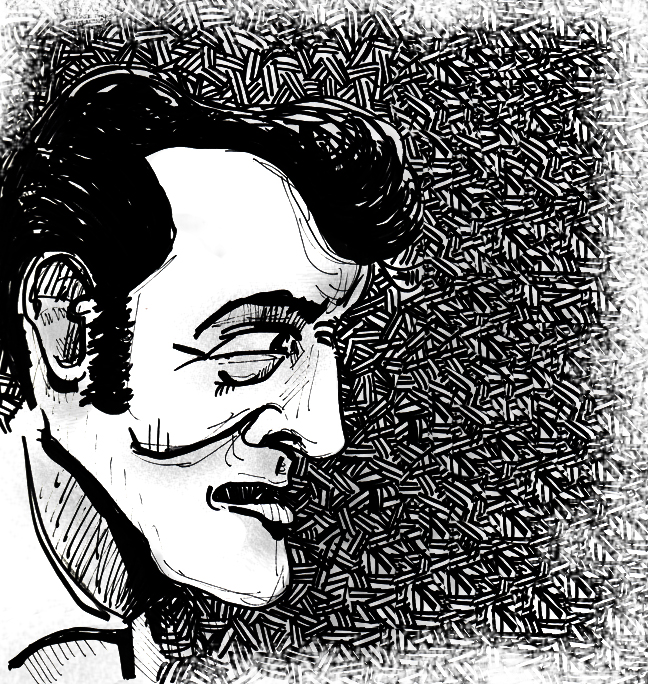
Oliver Sipple stood in the crowd. He was no different from the other 3,000 people gathered outside San Francisco’s St. Francis Hotel hoping to catch a glimpse of President Ford. As the President emerged from the building, Oliver looked and saw the woman next to him pull out a .38-caliber pistol and aim it at Ford as he headed to his limousine. Oliver lunged at the woman, Sara Jane Moore, just as her finger squeezed the trigger. The deflected bullet hit cab driver John Ludwig (who would survive). The police and the Secret Service immediately commended Oliver for his action and bravery. President Ford thanked him with a letter. The news media praised him as a hero. Oliver felt the praise and attention was unwarranted and shyed away. He was a former US Marine and Viet Nam veteran and instinctively did what anyone with his training would have done. The press hounded him. He pleaded to be left alone.
Oliver was gay and, although he participated in Gay Pride events, this was 1975 and his sexual orientation was a secret from his family. He begged the press to keep his sexuality off the record, making it clear that neither his mother nor his employer had knowledge of his orientation. The media ignored his request. San Francisco City Councilman Harvey Milk contacted the newspapers and proudly proclaimed Oliver’s status as a hero and role model for the gay community all against Oliver’s wishes. Oliver was besieged by more reporters, as was his family. His mother, a staunch Baptist in Detroit, refused to speak to him. Milk publicly suggested that Oliver’s sexual orientation was the reason he received only a note from the President, rather than an invitation to the White House.
Oliver filed a $15 million invasion of privacy suit against seven newspapers, and a number of unnamed publishers. The Superior Court in San Francisco dismissed the suit, and Oliver continued his legal battle until May 1984, when a state court of appeals held that Oliver had indeed become news, and that his sexual orientation was part of the story.
Oliver’s mental and physical health sharply declined over the years. He drank heavily and his weight ballooned to 300 pounds. He was fitted with a pacemaker. He became paranoid and suicidal. On February 2, 1989, he was found dead in his bed at his $334 per month apartment, at the age of forty-seven. Earlier, Oliver had visited a friend and said he had been turned away by the Veterans Administration hospital where he went concerning his difficulty in breathing due to pneumonia. Friends going through his affects in his apartment came across his most prized possession the framed letter from the White House.
Shortly before he died, Oliver expressed, to friends, his regrets toward grabbing Sara Jane Moore’s gun.

This is appalling, though i can’t say it’s all that surprising. Society can be very ugly.
on a lighter note, did he really look like Dick Miller?
Hi Josh!!! this is a great piece and I love that you always add some facts with your work!
Great stuff. Although, come to think of it, I’m sure he’s not the only one to regret grabbing that woman’s gun.
Sad and infuriating story; excellent work. As a former journalist who mostly respects journalists, this is a pathetic example of how media crosses the line — and exploits people.
Hi Josh
Good piece, however, as the author of “Taking Aim At The President: The Remarkable Story of the Woman Who Shot at Gerald Ford,” I must correct a few of the common and continued factual errors in your piece. Unfortunately, this kind of misinformation has been around for years as the government did not want the public to know how close Ford came to actually being assassinated.
What I’m about to correct in no way diminishes Oliver Sipple heroic “lunge” and saving the life of the President of the United States, no matter what you felt about Ford.
Here are the facts of the case as documented in court transcripts, the Secret Service, FBI and SF Police Department.
Indeed, Sipple was standing near Sara Jane Moore, but at the moment Ford stepped out of the St. Francis Hotel, all eyes were on Ford, not the person standing next to you.
When Moore fired the first time, her bullet missed Ford’s head by six inches as the sight was off on her gun. She had just bought it in haste that morning as her own .44 was confiscated the day before.
Of course, after that blast, everyone scurried away, except for Oliver Sipple, a former Marine and one who jumped into action. He is the only person–a non-official–who went towards the blast, not away from it.
As Moore went to correct her aim, Sipple grabbed at her arm and did indeed deflect a second, deadly shot.
Sipple saved Ford’s life and was dismissed like so much trash. What really infuriates me is to read many news posts that describe him as a “bystander!” Does not the person who save the president’s life deserve a name? http://www.huffingtonpost.com/geri-spieler
So, thank you for bring an important part of the story out. Sipple is a hero and deserves to be remembered as one. He got a lousy deal. Yet, now that Moore is out, more and more people are learning of Sipple’s life, his heroics and what happened after the fact.
wow. great story, even the comments add info. and the illo is, as ever, fab
If only Oliver Sipple had been hanging out at The Dakota.